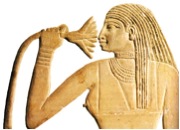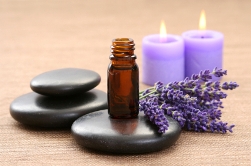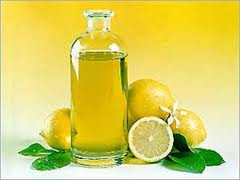Aromatherapy is a form of alternative medicine that uses plant materials, known as essential oils, and other aromatic compounds for the purpose of altering a person's mind, mood, cognitive function or health. (Wikipedia)
It is said that aromatherapy can prevent certain diseases and help reduce pain and anxiety, enhance your energy and short-term memory.
Two basic mechanisms are offered to explain the purported effects. One is the influence of aroma on the brain, especially the limbic system through the olfactory system. The other is the direct pharmacological effects of the essential oils.
Essential oils have been used for therapeutic purposes for nearly 6,000 years. The ancient Chinese, Indians, Egyptians, Greeks, and Romans used them in cosmetics, perfumes, and drugs. Essential oils were also commonly used for spiritual, therapeutic, hygienic, and ritualistic purposes.

[…]
More recently, René-Maurice Gattefossé, a French chemist, discovered the healing properties of lavender oil when he applied it to a burn on his hand caused by an explosion in his laboratory. He then started to analyze the chemical properties of essential oils and how they were used to treat burns, skin infections, gangrene, and wounds in soldiers during World War I. In 1928, Gattefossé founded the science of aromatherapy. By the 1950s massage therapists, beauticians, nurses, physiotherapists, doctors, and other health care providers began using aromatherapy.

Aromatherapy did not become popular in the United States until the 1980s. Today, many lotions, candles, and beauty products are sold as "aromatherapy." However, many of these products contain synthetic fragrances that do not have the same properties as essential oils.
Some experts believe our sense of smell may play a role. The "smell" receptors in your nose communicate with parts of your brain (the amygdala and hippocampus) that serve as storehouses for emotions and memories. When you breathe in essential oil molecules, some researchers believe they stimulate these parts of your brain and influence physical, emotional, and mental health. For example, scientists believe lavender stimulates the activity of brain cells in the amygdala similar to the way some sedative medications work. Other researchers think that molecules from essential oils may interact in the blood with hormones or enzymes.
http://www.umm.edu/altmed/articles/a...apy-000347.htm
Modes of application
Aerial diffusion: for environmental fragrancing or aerial disinfection
Direct inhalation: for respiratory disinfection, decongestion, expectoration as well as psychological effects
Topical applications: for general massage, baths, compresses, therapeutic skin care (Wikipedia)
Although essential oils have been used therapeutically for centuries, there is little published research on many of them. However, this is beginning to change as more scientific studies on essential oils are conducted around the world.
Clinical studies are currently underway in Europe, Australia, Japan, India, the United States, and Canada. Many of these studies describe the remarkable healing properties of various oils.
What does the research say?
Research studies on essential oils show positive effects for a variety of health concerns including infections, pain, anxiety, depression, tumors, premenstrual syndrome, nausea, and many others. The resources on this page are meant to highlight a few examples.
http://takingcharge.csh.umn.edu/expl...essential-oils The list of current studies on the benefits of aromatherapy in the same link.
As with any other type of WD treatments, this one, too, would need to be done in moderation, especially in early WD, when our bodies are ultra-sensitive to any kind of stimulation.
Please, share your experience with aromatherapy.










